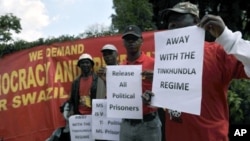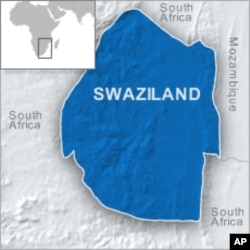In Swaziland police have arrested scores of activists, beaten others and fired tear gas and water cannon to prevent a planned pro-democracy protest.
Teachers, students and activists attempting to gather for a planned march in the city of Manzini Tuesday were among those beaten by police, who also set up road blocks, and turned away buses heading to the town. Several journalists were detained and released. Police say protesters threw stones at officers.
For weeks now, labor unions and pro-democracy activists have been organizing a so-called "12 April Uprising" through social media websites and cellphone text messaging. The event was planned to coincide with the 38th anniversary of the day former King Sobhuza II abandoned Swaziland's constitution and outlawed political parties. It was inspired by recent uprisings in north Africa.
Sipho Dube, a member of the pro-democracy movement who is currently in Johannesburg, said the demands of the protesters are quite simple.
"With these protests, we want a new multi-party constitutional democracy in Swaziland. We want to do away with the king, I mean he is the source of all our problems," he said.
King Mswati III is the last remaining absolute monarch on the African continent.
The Swazi economy has been severely affected by declining revenues from the Southern African Customs Union, partly a consequence of the global financial crisis and partly caused by the freeing up of trade in the region. Customs revenue accounts for two-thirds of government funding. The government recently declared a financial crisis and said it would cut civil service wages.
Dube says ordinary Swazis are suffering and yet money spent on the royal family continues to climb.
"70 percent of the population in Swaziland is surviving on less than a dollar a day, yet the monarchy is continuing to spend lavishly on cars, on palaces, on building more palaces for [King Mswati III]’s numerous wives," he said.
Dube says the South African government appears to be unconcerned about the people of Swaziland.
"How long are they just going to just stand back and watch at people being decimated, being abused in this way, just because it is a small country. I mean we have South Africa just next to us, and the government of South Africa is just being quiet on this," he said.
However, the pro-democracy movement has the support of South Africa’s Congress of Trade Unions, the powerful labor federation aligned to the ruling African National Congress; and, also the ANC Youth League.





